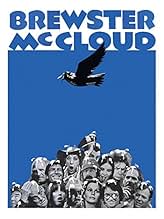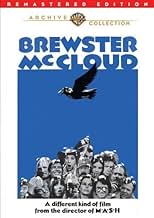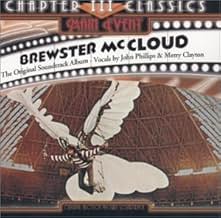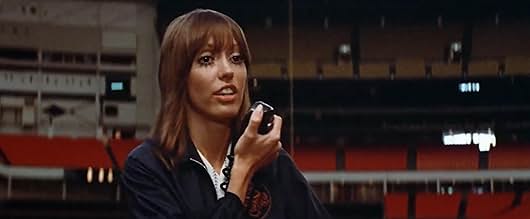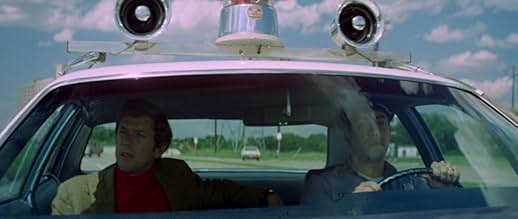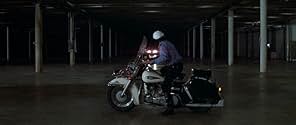ÉVALUATION IMDb
6,8/10
5,9 k
MA NOTE
Un solitaire introverti, vivant secrètement dans les entrailles de l'Astrodome de Houston, planifie de développer, avec l'aide d'un mystérieux ange gardien, une paire d'ailes qui pourraient ... Tout lireUn solitaire introverti, vivant secrètement dans les entrailles de l'Astrodome de Houston, planifie de développer, avec l'aide d'un mystérieux ange gardien, une paire d'ailes qui pourraient le faire voler au-dessus des foules.Un solitaire introverti, vivant secrètement dans les entrailles de l'Astrodome de Houston, planifie de développer, avec l'aide d'un mystérieux ange gardien, une paire d'ailes qui pourraient le faire voler au-dessus des foules.
- Prix
- 1 victoire et 2 nominations au total
Gary Chason
- Camera Store Clark
- (as Gary Wayne Chason)
Histoire
Le saviez-vous
- AnecdotesRobert Altman hated the script so much, he tossed it out and actors were coached on lines as they shot scenes.
- GaffesIn the scene where Brewster is supposed to have achieved independent flight while wearing birdlike apparatus, in a few places you can clearly see suspension cables attached to his bird costume.
- Citations
The Lecturer: [First line] I forgot the opening line.
- Générique farfeluDuring the end credits, all the actors turn up as Circus Performers and are introduced by the Ring Master - ending with Bud Cort, who lies dead in the center ring.
- ConnexionsFeatured in Altman on His Own Terms (2000)
- Bandes originalesLift Every Voice and Sing (Black National Hymn)
Written by J. Rosamond Johnson and James Weldon Johnson
Performed by Merry Clayton
[Played during the opening credits]
Commentaire en vedette
This oddball Altman film came out in the same year as M*A*S*H, but the two movies are stylistically very different. BC employs a conventional plot structure, whereas M*A*S*H featured an episodic style. Also, the latter film is best defined by its irreverent humor and hedonistic characters. Brewster McCloud, on the other hand, is more of a zany fantasy inhabited by bizarre characters who are not as sympathetic as the M*A*S*H characters.
Differences aside, the two films do have some traits in common. Many of the same players are in both films (Bud Cort, Sally Kellerman, G. Wood, Michael Murphy, John Schuck, Rene Auberjonois, and Corey Fischer). Also of note, BC is the debut of Shelley Duvall and marks the first of her many projects with Robert Altman. Moreover, both films have a detached narrator-type device which creates a middle ground in between the viewer and the main characters. In M*A*S*H, it was the camp PA system; in BC, it's the eccentric ornithologist/lecturer character. Lastly, both films make subtle statements about certain flaws in modern America. In M*A*S*H, this can be seen in the incessant ridiculing of the US military and US foreign policy. In BC, use of civil rights era gospel music and pithy references to Spiro Agnew and Nixon poke fun at American hypocrisy and ignorant conservatism.
The Houston Astrodome is without question a major character in BC. The protagonist (played by Cort) has one ambition in life: to take flight with a pair of wings he himself constructs. He lives in the bowels of the dome and spends his time there designing and building the instrument of his dream. He's always in danger whenever he leaves his "home" and the protection of his guardian (Kellerman). Whether he goes to the zoo or to a dome tourguide's apartment, he is in danger of being harmed by bigoted, violent people. In a sense, Brewster is not a member of the human race, but rather a bird trapped in human form. He finds haven in the Astrodome, but this is temporary and confining. He ultimately wants the freedom that "real" flight will provide him.
The themes of freedom and temptation are important in this film. Brewster longs for freedom, but is hindered in his realization of his dream by various characters and personal mistakes. Brewster can potentially "fly away", but there is one important condition. He can never have sex with a woman. If he does, he won't be able to achieve flight because his female guardian (Kellerman) will no longer protect him. But in typical human fashion, he falls for a girl. This character (Duvall) is his eventual downfall - literally! In the end, the film conveys the message that humans are never truly free. We are always controlled or confined by something, be it other people or our own desires or even the roof of the Astrodome. The dream of achieving flight is a metaphor in this film for man's incessant but futile wish to be free.
If you have no interest in these plot or thematic elements, Brewster McCloud is still worth watching just because of its bizarre humor, recurring jokes, and odd characters. Listen carefully, for there are many subtle jokes and satirical remarks. The trademark Altman audio style is used consistently throughout and if you listen carefully, you're bound to hear something funny or witty. When watching this one on video, be sure to crank the volume up high so that you clearly hear all the layers of Altman's "thick" sound mix. The ending - the final ten minutes of the film - is very memorable and provides a great finish to all the previous events. Unlike so many films, this movie's ending is neither anticlimactic nor corny, but rather profound and dramatic. You won't forget it!
Robert Altman created an absorbing, humorous, zany, and profound film in BC. To succeed in all these areas is no small feat. This film is a breath of fresh air when compared to the tripe Hollywood churns out on a weekly basis in 1999. I praise the work of Robert Altman. He's one of the few American directors in the past thirty years who's made interesting, unconventional, challenging, and highly entertaining films on a consistent basis and with his own unique style. It's a shame that only a few of his films (invariably M*A*S*H, Nashville, The Player, and Short Cuts; very rarely McCabe and Mrs. Miller) can be found in video stores. The obscure gems like Brewster McCloud (Thieves Like Us and Three Women also fall into this category) are nearly impossible to see, unless you buy the videos off the internet. Considering all the garbage produced by Hollywood nowadays, I advocate a revival of all the Robert Altman films made between 1969 and 1977 ("A Wedding" (1978) marks the beginning of the decline of his work, some might say). Oh, well. It never hurts to dream. Every once in awhile, a great Altman flick is shown on premium cable. I guess that is as good as it will get.
Differences aside, the two films do have some traits in common. Many of the same players are in both films (Bud Cort, Sally Kellerman, G. Wood, Michael Murphy, John Schuck, Rene Auberjonois, and Corey Fischer). Also of note, BC is the debut of Shelley Duvall and marks the first of her many projects with Robert Altman. Moreover, both films have a detached narrator-type device which creates a middle ground in between the viewer and the main characters. In M*A*S*H, it was the camp PA system; in BC, it's the eccentric ornithologist/lecturer character. Lastly, both films make subtle statements about certain flaws in modern America. In M*A*S*H, this can be seen in the incessant ridiculing of the US military and US foreign policy. In BC, use of civil rights era gospel music and pithy references to Spiro Agnew and Nixon poke fun at American hypocrisy and ignorant conservatism.
The Houston Astrodome is without question a major character in BC. The protagonist (played by Cort) has one ambition in life: to take flight with a pair of wings he himself constructs. He lives in the bowels of the dome and spends his time there designing and building the instrument of his dream. He's always in danger whenever he leaves his "home" and the protection of his guardian (Kellerman). Whether he goes to the zoo or to a dome tourguide's apartment, he is in danger of being harmed by bigoted, violent people. In a sense, Brewster is not a member of the human race, but rather a bird trapped in human form. He finds haven in the Astrodome, but this is temporary and confining. He ultimately wants the freedom that "real" flight will provide him.
The themes of freedom and temptation are important in this film. Brewster longs for freedom, but is hindered in his realization of his dream by various characters and personal mistakes. Brewster can potentially "fly away", but there is one important condition. He can never have sex with a woman. If he does, he won't be able to achieve flight because his female guardian (Kellerman) will no longer protect him. But in typical human fashion, he falls for a girl. This character (Duvall) is his eventual downfall - literally! In the end, the film conveys the message that humans are never truly free. We are always controlled or confined by something, be it other people or our own desires or even the roof of the Astrodome. The dream of achieving flight is a metaphor in this film for man's incessant but futile wish to be free.
If you have no interest in these plot or thematic elements, Brewster McCloud is still worth watching just because of its bizarre humor, recurring jokes, and odd characters. Listen carefully, for there are many subtle jokes and satirical remarks. The trademark Altman audio style is used consistently throughout and if you listen carefully, you're bound to hear something funny or witty. When watching this one on video, be sure to crank the volume up high so that you clearly hear all the layers of Altman's "thick" sound mix. The ending - the final ten minutes of the film - is very memorable and provides a great finish to all the previous events. Unlike so many films, this movie's ending is neither anticlimactic nor corny, but rather profound and dramatic. You won't forget it!
Robert Altman created an absorbing, humorous, zany, and profound film in BC. To succeed in all these areas is no small feat. This film is a breath of fresh air when compared to the tripe Hollywood churns out on a weekly basis in 1999. I praise the work of Robert Altman. He's one of the few American directors in the past thirty years who's made interesting, unconventional, challenging, and highly entertaining films on a consistent basis and with his own unique style. It's a shame that only a few of his films (invariably M*A*S*H, Nashville, The Player, and Short Cuts; very rarely McCabe and Mrs. Miller) can be found in video stores. The obscure gems like Brewster McCloud (Thieves Like Us and Three Women also fall into this category) are nearly impossible to see, unless you buy the videos off the internet. Considering all the garbage produced by Hollywood nowadays, I advocate a revival of all the Robert Altman films made between 1969 and 1977 ("A Wedding" (1978) marks the beginning of the decline of his work, some might say). Oh, well. It never hurts to dream. Every once in awhile, a great Altman flick is shown on premium cable. I guess that is as good as it will get.
- Freak-30
- 24 sept. 1999
- Lien permanent
Meilleurs choix
Connectez-vous pour évaluer et surveiller les recommandations personnalisées
- How long is Brewster McCloud?Propulsé par Alexa
Détails
- Date de sortie
- Pays d’origine
- Langue
- Aussi connu sous le nom de
- Brewster McCloud's (Sexy) Flying Machine
- Lieux de tournage
- sociétés de production
- Consultez plus de crédits d'entreprise sur IMDbPro
Box-office
- Budget
- 5 600 000 $ US (estimation)
Contribuer à cette page
Suggérer une modification ou ajouter du contenu manquant

Lacune principale
By what name was Brewster McCloud (1970) officially released in India in English?
Répondre



